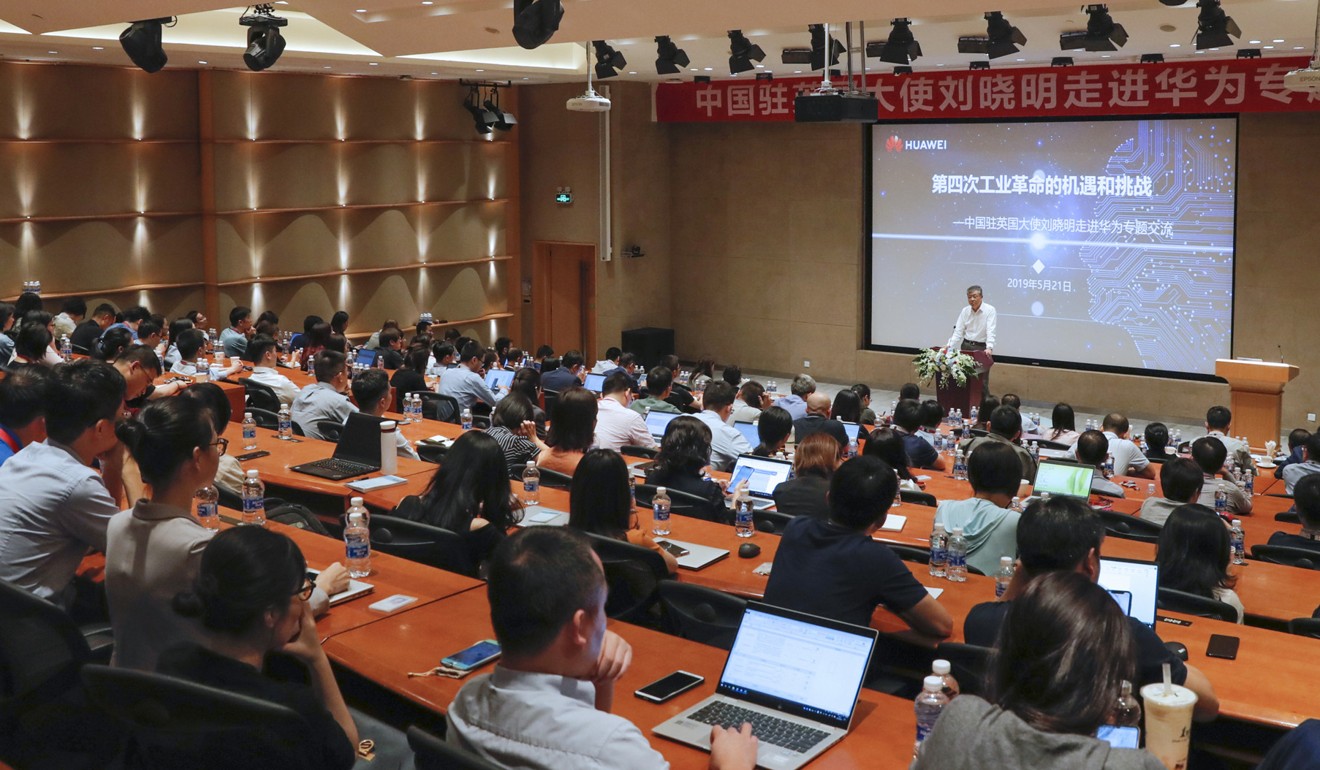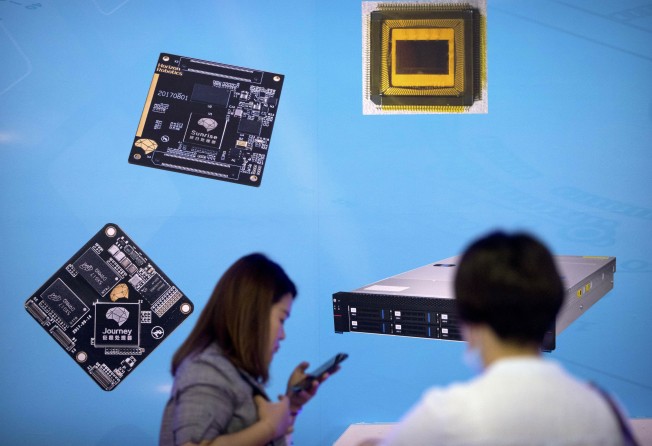
Technology is true target of US attack on China, says diplomat
- Chinese ambassador to Britain joins chorus of criticism of US ‘economic bullying’
- Accuses Washington of ulterior motive behind trade war

The real motive behind Washington’s aggression towards China is to wage a technology war to contain the country’s rise, the Chinese ambassador to Britain said early this week, during a visit to the southeastern Chinese metropolis of Shenzhen.
Delivering a speech at Huawei University in Shenzhen, ambassador Liu Xiaoming said the US was only using the trade dispute with China to disguise its intention of containing the country’s emergence as a new technological power.
The university is a training, research and development centre providing technical and career development to technology giant Huawei’s staff.
A state television report on Friday into Liu’s assessment followed the American ban against Huawei Technologies, and a suggestion by US President Donald Trump that the Chinese telecom giant could be a bargaining chip in the trade talks with Beijing, in a deviation from his trade negotiators’ longheld position.
“If we made a deal, I could imagine Huawei possibly being included in some form of or some part of a trade deal,” Trump said on Thursday at the White House after speaking about his plan to give a multibillion-dollar subsidy package to American farmers affected by the tariff war.
“There are many reasons for the US to wage the trade war with China, but they are not the real motives: on face value they launched a trade war, but underlying it is the waging of a technology war to curb China’s growth in technological advancement,” Liu said, according to CCTV on Friday.

“Therefore the US would not be satisfied with driving Huawei out of the US market, it also wants to force Huawei out from markets around the world.
“There is a growing view in the US that China is becoming a formidable competitor in all areas such as geopolitics, international influence, resources, population and talent. This is also evident from the fact that the US government has identified China as a strategic competitor in its National Defence Strategy report.”
On Thursday, US President Donald Trump said Huawei was “something that’s very dangerous” to US security and military, but suggested that issues about the company could be included in a trade deal between the two countries.
Ambassador Liu is not the only one to take the China hawks in Washington to task in recent days. A number of his colleagues have also openly criticised the US for engaging in “economic bullying” against Chinese technology champions such as Huawei.
They have warned the US not to go “further down the wrong path” and urged Washington to create the right atmosphere conducive to trade talks.
Foreign Minister Wang Yi, for example, on Wednesday said the US had so far produced no evidence to support its allegations against Huawei.
“Nowadays some people in the US do not want China to have a reasonable right of development and attempt to block the development path of China,” Wang said.
“As a typical example, without any factual proof, [the US] used unwarranted charges and state power to suppress a private Chinese enterprise like Huawei.”
Global Times, a tabloid newspaper affiliated with Communist Party mouthpiece People’s Daily, published an editorial late on Thursday attacking former White House chief strategist Steve Bannon for telling the South China Morning Post that it was “10 times more important” to drive Huawei out of the US and world markets, than to end the trade war with China that has rattled the world’s economy.
The editorial criticised Bannon for “promoting economic fascism” to achieve the “economic subjugation of China”.
“Even the most radical opinion leaders in China would not have called for driving Apple or McDonald’s out of the China market. But Bannon’s extreme remarks can exert some impact on US society and he is in fact quite proud of being hawkish [on China], which shows that the rational foundations of the country are being eroded,” the Global Times editorial said.
“The tide of extremism is on the rise,” it continued, in both the newspaper’s Chinese and English editions.
“Regrettably, besides Bannon, a group of economic fascists has emerged in the US. They see China’s economic development and prosperity as a fundamental threat to the US. The disruption of the global supply chain that they have triggered is destroying the foundation of globalisation.
“They have brought deep-rooted hostility to this world and they are threatening the peace of the 21st century.
“The evil thinking of Bannon against China is the epitome of the vicious ideas of some US elites towards China. It is not yet clear whether what they advocate will actually become the China policy of the US government,” it said.
Guangming Daily, a flagship party mouthpiece targeting the country’s intellectuals, also blasted Bannon on Friday with an article by Shen Yi, a professor of the school of international relations and public affairs at Shanghai’s Fudan University.
Shen criticised Bannon’s views on China and Huawei as a McCarthyist approach “to safeguard US hegemony”. He added that Bannon had been advocating curbing China’s rise as a technological power, as well as an economic and financial power from challenging the US’ dominance in global financial markets.
Shen added that Washington’s latest attacks on Huawei could also be a diversion from the prolonged trade war with Beijing, as the dispute had also taken a toll on the US financial market.
Yu Miaojie, an international trade expert and professor with Peking University, said the US wanted to ensure China would not challenge its position at the apex of the global value chains, including advanced technologies and hi-tech products.
“The technology war or even a financial war are all extensions of the trade war,” Yu said.
Shi Yinhong, an international relations professor with Renmin University, doubted whether including Huawei would help the countries reach a trade deal.
“The US Trump administration is going after China’s development in hi-tech, not seeing it as a tactic or a bargaining chip in the [trade] negotiation. Yet China has very little room for compromise in this regard. Therefore the [Huawei] issue is aggravating the Sino-American trade war and reducing the probability for a deal to cut tariffs,” Shi said.
“[China and US leaders] may still meet at the G20 summit [in Japan next month], but how would a basic agreement be reached there?”
China-US specialist Zhu Feng, director of Nanjing University’s Institute of International Relations, shared their pessimism towards the prospect of a revitalisation in the trade talks, citing Chinese domestic propaganda which had already portrayed Washington as forcing Beijing to sign an unequal treaty.
He said Washington was also concerned that China would apply its advanced technologies in the defence sector, which may one day tip the military balance.
“The US has openly waged both a trade war and technology war [with China], not just in disguise on the technology front,” Zhu said.
Additional reporting by Owen Churchill